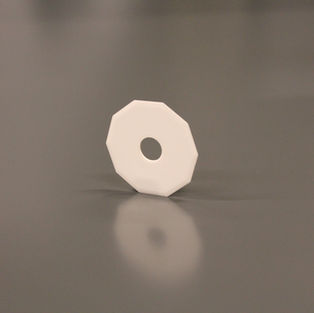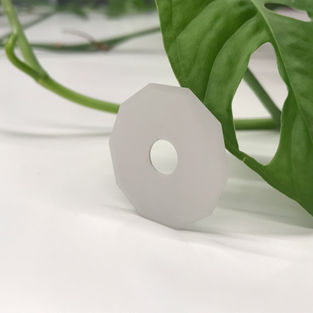ADVANCED CERAMICS TECHNOLOGIES
CERAMIC BLADE

Ceramic blades are becoming increasingly popular as they offer several advantages over traditional blades made of steel or other materials. Here are some of the benefits of ceramic blades:
-
Sharpness: Due to their hardness and density, ceramic blades are very sharp and retain their sharpness longer than steel blades. As a result, they need to be sharpened less often.
-
Corrosion Resistance: Ceramic is a non-reactive material and therefore does not corrode. Ceramic blades are therefore resistant to corrosive substances and acids.
-
Lightness: Ceramic is a light material and ceramic blades are therefore lighter than comparable blades made of steel or other materials.
-
No transfer of odors or flavors: Unlike blades made of steel or other materials, ceramic blades do not emit any odors or flavors into the material being cut.
-
Hygiene: Ceramic blades are easy to clean and sterilize, making them ideal for food or medical applications.
However, there are also some disadvantages of ceramic blades. For example, they can be brittle and damaged if they are subjected to excessive loads or if they fall. Also, due to their hardness, they can be more difficult to sharpen than steel blades.
THE ADVANTAGES OF CERAMIC BLADES
One of the biggest advantages of ceramic knives is that they last longer than steel knives. Ceramic is much harder than metal and can therefore keep a blade sharp longer. Because the harder the material and the thinner the grind, the longer a knife stays sharp. However, it is often assumed that ceramic knives cannot become blunt. This is wrong and one of the many marketing promises that do not correspond to reality.
Advantages:
-
Stay sharp a little longer
-
Resistant to acids, stains and odors
-
Suitable for metal allergies and hypersensitivity to metal
-
Suitable for soft and acidic foods such as fruit
-
Cannot rust
-
Theoretically dishwasher safe
THE DISADVANTAGES OF CERAMIC BLADES
There are also some disadvantages of ceramic blades:
-
Brittleness: Ceramic blades are more brittle than steel blades and can be damaged or broken if subjected to excessive stress or if dropped.
-
More Difficult to Sharpen: Although ceramic blades are very sharp and retain their sharpness for a long time, their hardness makes them more difficult to sharpen than steel blades.
-
More expensive: Blades made from ceramic are typically more expensive than blades made from steel or other materials, which can make them less attractive for some applications.
-
Limitations of Use: Ceramic blades may not be suitable for all applications as their brittleness and hardness may not make them as strong as blades made from other materials.
-
Side Load Sensitivity: Ceramic blades are very hard and sharp, but they are sensitive to side loads that can be caused by canting or twisting of the blade.
It is important that the pros and cons are considered when using ceramic blades to ensure they are suitable for the intended application and treated properly to ensure their durability.










